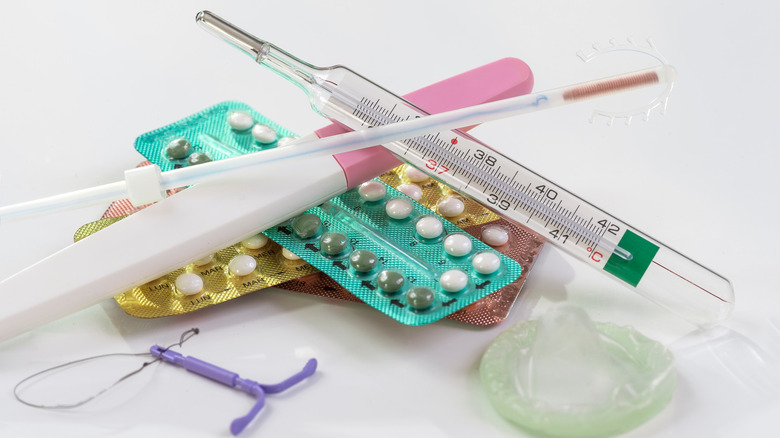You Should Stop Taking Birth Control If This Happens To You
Women around the world rely on birth control to prevent unwanted pregnancies. There are many different types of birth control available with a prescription, including pills, patches, IUDs, rings, shots, and implants (via Healthline). Each type has its own risks and benefits which should be addressed with your doctor.
There are many potential side effects that come with taking hormonal birth control. Some of these side effects are normal, some are temporary, and some are cause for concern. An IUD, shot, ring, or implant may cause temporary pain during and shortly after the insertion or procedure, but should go away in a few days. Breast tenderness is common for the first few weeks of taking birth control, as well as breast enlargement, headaches, and nausea.
Some potential side effects are thought to be normal but are actually a reason to check in with your doctor. Weight gain, for example, is often touted as a common side effect of birth control pills but it's actually pretty uncommon. "Most women who use [birth control] will not gain weight, but if you are one of the women who does, you can find another method that's better for you and your body," Nerys Benfield, M.D., told Glamour.
It's important to be aware of the serious side effects of birth control
According to WebMD, "All methods of contraception are considered okay for healthy women." While birth control is generally safe, everyone taking some form of birth control should be aware of the potential health risks. Arguably the scariest one is the risk of forming blood clots, which is a rare side effect in contraceptives containing estrogen.
"A woman's general risk of blood clots is around 1 in 10,000; while on estrogen-containing birth control it rises to about 3 in 10,000," Colleen Krajewski, MD, an assistant professor of Obstetrics, Gynecology, and Reproductive Sciences at the University of Pittsburgh, told WebMD. "So while it does triple, it is still extremely low." Symptoms of a blood clot include swelling, pain, tenderness, and redness of the skin (via CDC). If you notice any of these symptoms, stop taking your birth control immediately and call your doctor.
You should also stop taking birth control if you become pregnant or think you are pregnant. While it hasn't been proven that taking birth control in the early stages of pregnancy can cause birth defects, it is still recommended that you stop taking the contraceptive until pregnancy has been confirmed if you aren't sure (via Mayo Clinic).


